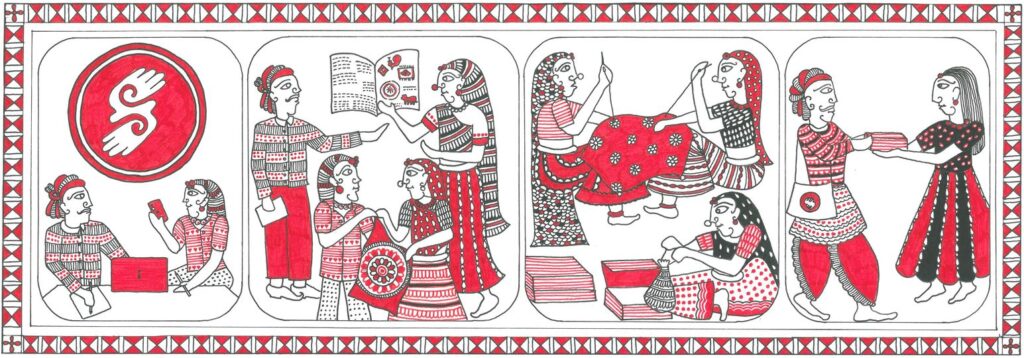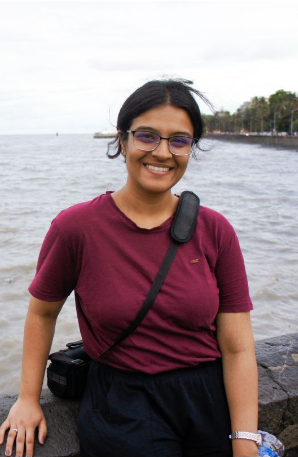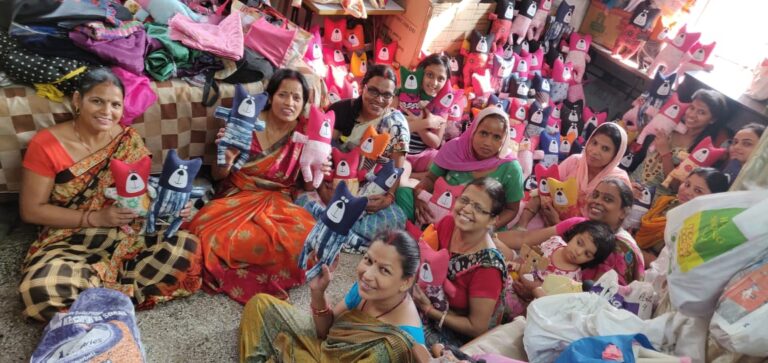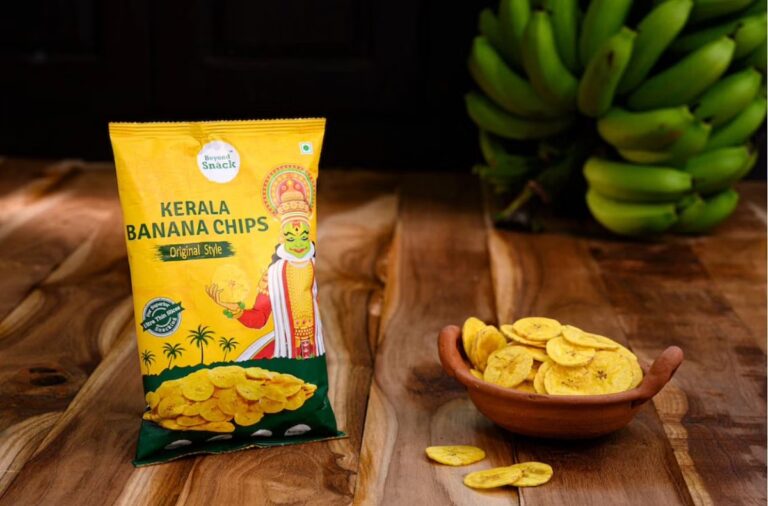Kaarigar Clinic, India’s first rural development venture, creates a bridge between rural and urban households. With business training, technology and design upskilling, marketing, business health checks, and connecting artists with a network of collaborators across the nation, it enables them to become entrepreneurs. Follow our conversation with Dr. Nilesh Priyadarshi, Kaarigar Clinic’s humble founder, as he narrates his experiential journey of empowering artisans and taking them from their unknown villages to the KBC hot seat and the Shark Tank.

‘If not Now, then When…?’ – A Determined Beginning
I am from Ahmadabad, Gujarat. After completing my formal education in electrical engineering and then in management, I had two opportunities in front of me – I could either work at a regular corporate job or I could work at the grassroots level to bring about change.
While making this choice back then, I was reading Bill Gates’ autobiography, wherein he had very lucidly written how he dedicated the prime of his life to Microsoft. He earned billions of dollars, but after crossing the age of 60, he donated the majority of his wealth and did charity work as that gave him a real sense of happiness. And this story is not just his but many others have followed the same path. People get retired or rather get tired and then rethink what they did all their lives and then get into social work. That’s why I thought that if life’s ultimate goal is happiness then why wait till 60? Why not earlier? Why not now?
I was visiting Kutch in 2001 during the Bhuj earthquake which made my life take a completely different turn. I met some Italian NGOs working in a region with a poor education ratio. They were seeking someone with an engineering background to help educate the youth and I agreed to join them. I used to stay there in the village, which is how I gradually learned about the prevalent culture, craft forms, and problems faced by the existing artisans. After the 3-year project, I decided to do something for these artisans. I joined a leading NGO to work on this cause and stayed there for 13 years. I learned and understood more, I could see major problems at the grassroots level. As time demanded, I moved to Ahmadabad and joined Fab India to head their business operations in Gujarat, Rajasthan, and Madhya Pradesh. For 6 years I understood the business of Fab India. Now I was empowered with the experience of working at a leading NGO and Corporate in the crafts sector. I knew the system in and out.
In all these years, I identified one pain point no organization was working on. In promoting handicrafts and products, the artisans were left behind. There was no significant impact made on their lives. They remained hidden. All the artisans that I had interacted with had the same wish – getting an identity of their own and not just remaining as the hands behind creating beautiful products.
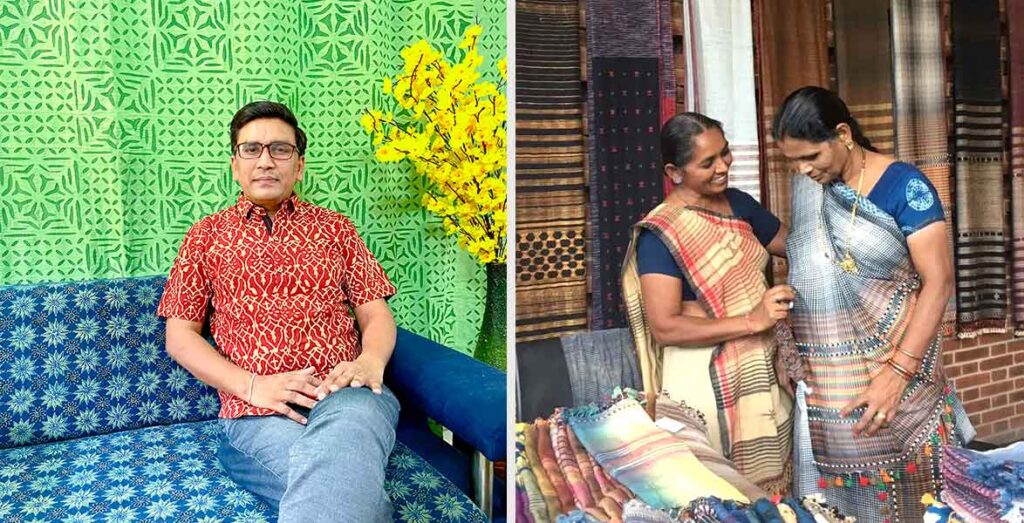
I left Fab India and joined Gujarat Vidyapeeth as a Research Scholar to understand the pain points of artisans beyond the geographical boundaries. After 3 years of research, the perception that artisans want money broke. More than 90% of the artisans yearned for identity, value, and recognition which was far more important than money. No NGO or Corporate does that.
I delved deeper into research to know why these artisans wanted identity. Unlike the ancient marketplaces where sellers and consumers were face-to-face and goods were usually asked for as – ‘Ramjibhai ke Khet ki sabzi, Gangaben ke ghar ka doodh, Shyam bhai ka buna hua kambal…’ It was a time when sellers and consumers were acquainted with each other.

But as technology came in, the culture of a faceless market developed. Human interaction lessened. Artisanal products can be bought in big stores without knowing anything about the artisan who made it and even the artisan doesn’t get to know who purchases his/her products. This is why it becomes necessary to give recognition and value to the artisan. So we built a model during research that talked about establishing the artisan and his craft as a unique and standalone brand in the market. This model was named Kaarigar Clinic.
Pabiben.com – Building the Shark Tank Artisan cum Entrepreneur
The name Kaarigar Clinic was inspired by the way the organization operates, which is to assess a product’s commercial viability and the difficulties faced by its creators before prescribing a course of action to close any gaps. After that, the Clinic starts to assist the aspiring business owner for a few years, helping him or her build the brand until they can manage the company independently.
Someone may not have a strong product, so we develop the product, someone may have a good product but it does not get business, so we do its branding and marketing. We get involved from Stage Zero to a stage where the turnover is about ₹25-30 lakh. Once entrepreneurs get a turnover and the confidence to operate on their own, they work independently
From Kutch to KBC and Shark Tank
Pabiben is our first stellar Kaarigar. Pabiben Rabari is the founder of the company pabiben.com. She is from Gujarat and considers herself a businesswoman and an artist. Women of her community learn to do Rabari art from an early age. But big designers buy this artwork at a cheaper cost and sell it at higher prices. Hence, the women get no money and no recognition. This affected Pabiben Rabari a lot. To make a change, Pabiben dared to start one of the first Women Artisan-led enterprises.
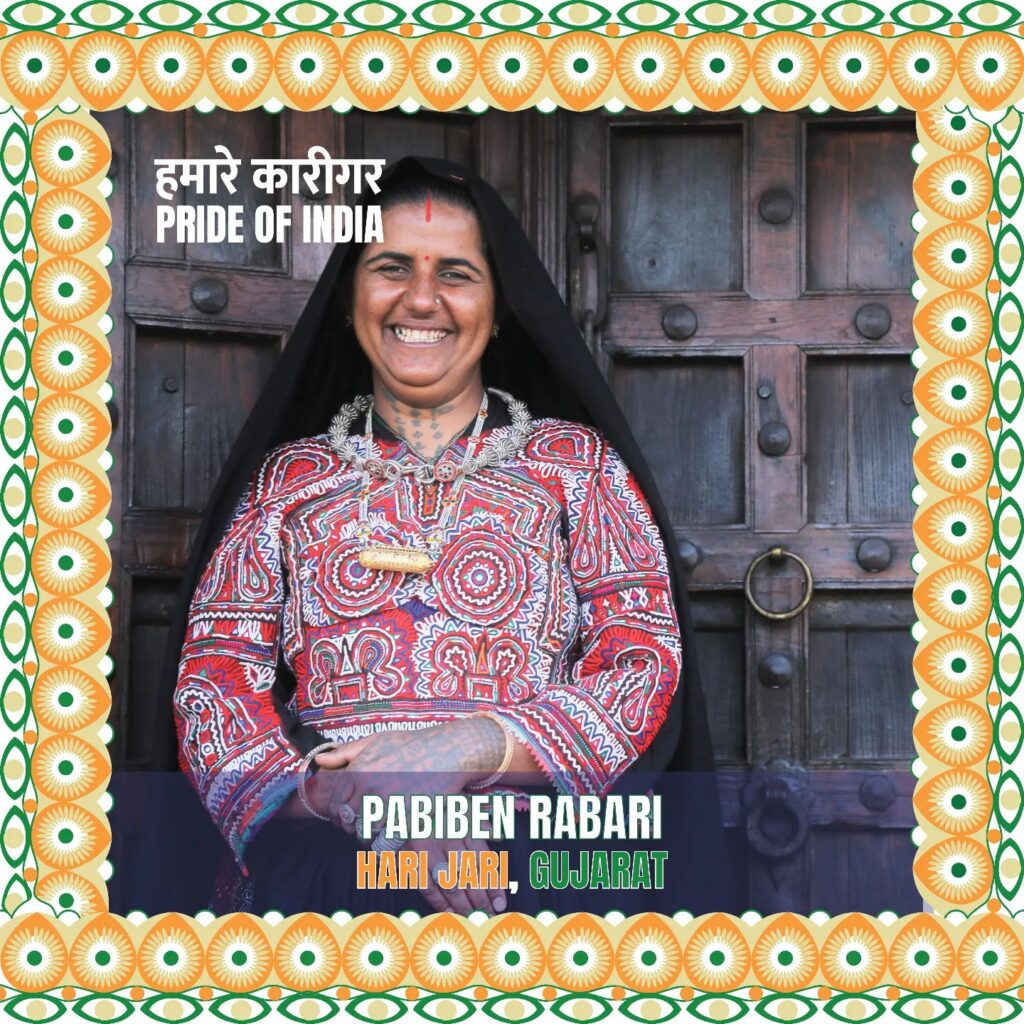
We encouraged and helped Pabiben in her venture. From capacity building to imbibing Gandhian values like an emphasis on Handwork, no exploitation of artisans, and no mass production but rather production for the masses, we nurtured pabiben.com. Today, Pabiben has become a global face for women’s empowerment, earns Rs. 25 lakhs a year and supports 150 women in her community.
Pabiben has won various awards and accolades for her work and has been recognized globally. Her success has taken her to the hot seat of Kaun Banega Crorepati, in conversation with Mr. Amitabh Bacchan and she recently pitched her venture at Shark Tank India to even secure funding. It fills me with immense happiness and pride to see her grow.
Alongside Pabiben, we have nurtured more such amazing kaarigars – Rajiben, who hand-weaves upcycled plastic; Mubeen and Jabbar Khatri, who do hand-block printing and textile artist Jyotsanaben. Annual revenues range from ₹15 lakhs to over a crore.
Can we develop 1-billion kaarigars like Pabiben rather than developing a 1-billion-dollar company?
Lack of education, money, and resources have caused these extremely skilled artisans to lag. Unemployment and urbanization are the two leading causes of leaving handicrafts. We aim to create local entrepreneurs, with the capacity to employ at least 100 more people. Our vision is to develop 1000 such entrepreneurs.
The Local Gift Box
To fight covid when markets were closed and nobody was meeting each other, we decided to launch the Local Gift Box. Gifts can strengthen relationships. We conducted surveys to judge people’s interest in handicraft items and receiving them as gifts. People were interested but wanted them in an affordable price range of between Rs. 1000-1500.
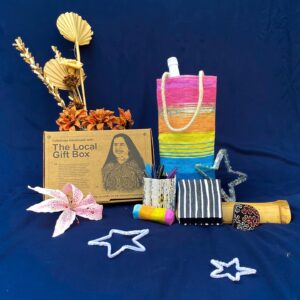 We strategically curated a box with functional items for every member of any family within the price range and asked the artisans to make the items, hence generating employment for them. The problem was how to reach people because everyone loves, or rather complimentary gifts. So we used this as a strategy and selected 250 people who would receive these boxes for free, with a message that conveyed if they liked the products, they could order them to gift their friends as memorabilia. It started a giveaway chain across the country. The campaign was extremely successful and we received hundreds of orders internationally. We received our KBC invite after taking on this initiative.
We strategically curated a box with functional items for every member of any family within the price range and asked the artisans to make the items, hence generating employment for them. The problem was how to reach people because everyone loves, or rather complimentary gifts. So we used this as a strategy and selected 250 people who would receive these boxes for free, with a message that conveyed if they liked the products, they could order them to gift their friends as memorabilia. It started a giveaway chain across the country. The campaign was extremely successful and we received hundreds of orders internationally. We received our KBC invite after taking on this initiative.
Ravivari
Inspired by the Sunday markets of Ahmadabad, Ravivari is our one-of-a-kind digital marketplace where we sell unique handcrafted goods only on Sundays.

Our idea behind launching this was to solve the issue of finely designed items sitting idle.
Kaarigar ki Dukan and Kaarigar ki Kahani are also part of our initiatives. We are also planning to start a cohort of 25 artisans to develop them. Most skill-building sessions fail because they aren’t tailor-made according to the needs of the artisan. We aim to intervene in every aspect including design development, product marketing, branding, capital influx, etc. to bridge any gaps. Our focus, for now, will be on the Gujarat region and those surrounding it.
Me and my co-founder, Ms. Noopur Kumari, a design graduate from NIFT, are on a mission to build impactful individual identities for every single artisan because ‘Pehchan se bada kuch nahi…’
Our local communities are the backbone of our nation.
NICEorg wishes Kaarigar Clinic the best of luck in its journey ahead!
If your cultural enterprise is in any of our five focus sectors and you would be interested in being featured, write to us at NICEorg
